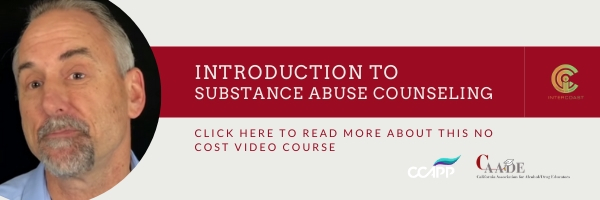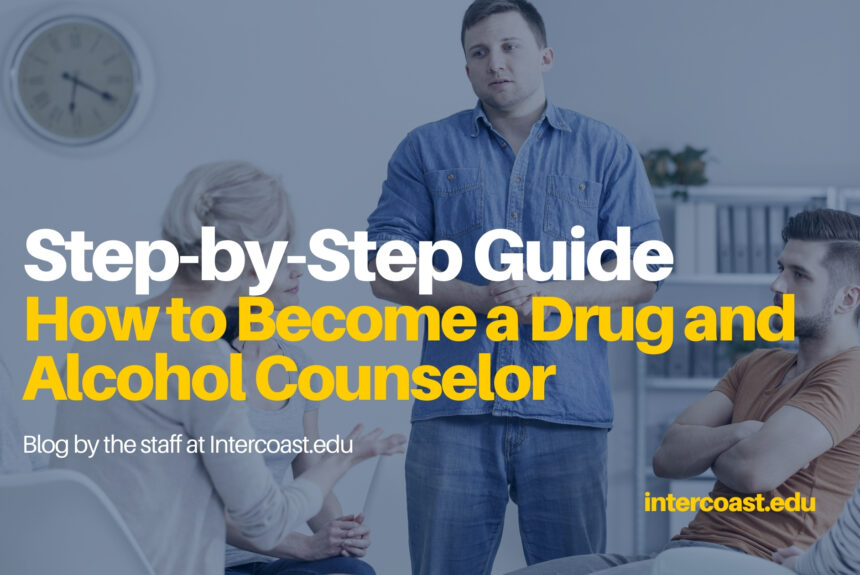Estimated reading time: 6 minutes
Table of contents
- What Is a Drug and Alcohol Counselor?
- How to Become a Drug and Alcohol Counselor
- 1. Complete an Accredited Training Program
- 2. Register with an Approved Certifying Organization
- 3. Complete a Period of Supervised Clinical Practice
- 4. Pass a Certification Exam
- 5. Submit an Initial Certification Application
- 6. Secure Employment in the Field
- 7. Complete Continuing Education Requirements and Renew Your Certification
- Drug And Alcohol Counselors: Helping Patients Say “No” to Drugs and Alcohol and “Yes” to Life
According to the Bureau of Labor Statistics (as of December 2020), in 2019, the median salary for a full-time, experienced drug and alcohol counselor was $46,240.
The job outlook for individuals seeking work in this field is also strong. The BLS anticipates its growth rate at 25% for the next ten years. This is more than six times the average growth rate for all occupations.
If you’re looking to enter the field, these long-term financial benefits are appealing. However, you’re also looking forward to a career as entry-level alcohol and drug counselor because it will allow you to help others.
So what’s the path to this rewarding career? In this guide, you’ll learn everything you need to know about how to become a drug and alcohol counselor.
What Is a Drug and Alcohol Counselor?
Drug and alcohol counselors are also called addiction counselors or substance use disorder counselors. They are trained professionals who offer individual and group counseling. Their patients include individuals suffering from alcoholism and drug addiction.
Substance use disorder counselors work to change patients’ problem behaviors. By changing these behaviors, the treatment promotes recovery and works toward preventing relapse.
How to Become a Drug and Alcohol Counselor
Becoming a drug and alcohol counselor requires specialized training. In California, the training is offered in select vocational schools and colleges and prepares graduates for certification with two of California’s main certification bodies.
1. Complete an Accredited Training Program
InterCoast Colleges offers two training paths that equip students to become certified.
Some students choose an AAS degree in Substance Use Disorders. Others prefer a certificate program in Alcohol and Drug Counseling Studies.
These programs are CAADE, and CCAPP certified.
AAS Degree in Substance Use Disorders
An AAS degree is an associate’s degree in applied sciences in Substance Use Disorder Counseling. Students who complete this path learn counseling theories and skills from industry veterans. They also complete supervised clinical practicum and a clinical internship. These experiences give students the skills to succeed in entry-level drug and alcohol counseling.
Students in the AAS degree program also complete general education requirements. These include courses such as English, biology, mathematics, sociology, and professional development.
The AAS program is designed for students who don’t have drug counseling experience. At its completion, students are prepared for entry-level employment in the field.
Alcohol and Drug Counseling Certificate Program
Students seeking a quicker path to entry-level employment may choose a certificate program. Like the AAS program, the Alcohol and Drug Counseling certificate program is designed for students who do not have experience in the field.
During the program, students complete 905 hours of theoretical and practical study. Coursework and field experience teaches students the knowledge and skills necessary to:
- Manage individual and group counseling sessions using culturally-competent techniques
- Equip clients with coping skills to promote recovery and prevent relapse
- Communicate with patients and families while following laws governing medical records and privacy
- Promote the therapeutic alliance between the patient and therapist based on agreed-upon goals and tasks
Students can complete this program in as little as 50 weeks.
Bachelor’s Degree Programs in Related Fields
Many prospective counselors complete an AAS or certificate program at a community college. Others, though, enter the field after completing a four-year degree in a related field. These fields include:
- Psychology
- Sociology
- Counseling
- Addiction Studies
- Human Services
- Criminal Justice
- Behavior Health or Behavioral Science
Of course, four-year degree programs are more expensive than community college programs. They also take significantly longer to complete. Still, they remain an option for students who intend to pursue advanced training.
2. Register with an Approved Certifying Organization
To work as a drug and alcohol counselor, you’ll need to take a program approved by the certifying body. Drug and alcohol counselor certification requirements vary by state. Additionally, like California, many states include several organizations that provide certification. Most graduates will choose to become certified through CCAPP or CAADE.
Registering with one of the certifying bodies will begin the path toward certification. It also lets you complete later steps in the certification process as you progress with your education and work experience.
3. Complete a Period of Supervised Clinical Practice
Completing a clinical internship is among the most significant steps of the certification process. During this period, you’ll work in the field under a qualified clinical supervisor. At your clinical site is where you will have the opportunity to apply theories and techniques learned in the classroom to real situations.
Different certification bodies and different levels of certification pose different requirements. In all cases, however, there are required clinical hours for certification.
Your training program will likely incorporate some clinical practice hours. However, many certification bodies let candidates count paid and unpaid hours toward the requirement.
Your training program can help you find a facility that matches your interests. The CAADE website also offers a job board. Registering for access to job postings is free. These resources can help you find an internship or, later, full-time employment.
4. Pass a Certification Exam
After completing other requirements, prospective counselors must pass a certification exam.
If you choose to become certified through the CCAPP, you’ll take the IC&RC exam. Successful candidates must achieve a passing score of 70% or higher on this exam.
5. Submit an Initial Certification Application
Again, different certifying bodies have different requirements and procedures. In all cases, though, prospective counselors must apply for initial certification to verify that the certifying body approves the college’s curriculum and that the applicant met all requirements as required by the certifying body. Applications will require the submission of college transcripts and evidence of completion of clinical internship hours. These are usually the requirements, although there may be others. It’s always a good idea to check with the certifying body before applying.
6. Secure Employment in the Field
Following certification, some counselors continue at the facility where they completed their internship. Others explore positions with other organizations.
Once again, your training program can provide valuable career services. Job postings via the CAADE online database are also helpful. CCAPP also has useful resources on its website.
7. Complete Continuing Education Requirements and Renew Your Certification
As a drug and alcohol counselor, you’ll need to renew your certification as required. Continuing education credits may also be required to renew your certification.
Organizations like CAADE and CCAPP offer continuing education coursework to meet these requirements.
Drug And Alcohol Counselors: Helping Patients Say “No” to Drugs and Alcohol and “Yes” to Life
Now that you know how to become a drug and alcohol counselor, you can get down to the business of changing lives.
Perhaps you’re interested in an AAS degree or certificate program. Either way, InterCoast Colleges has you covered. Apply online for our Alcohol and Drug Counseling Studies or Associates Degree Program in Substance Use Disorder Counseling Programs today.


